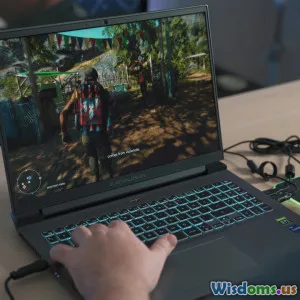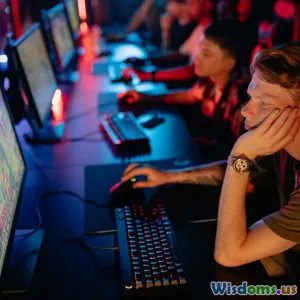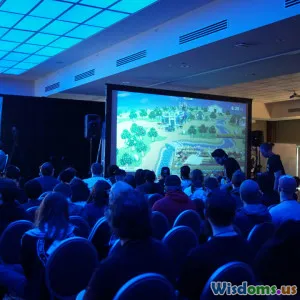
Comparing PC Clans to Console Guilds for Better Teamplay
11 min read A detailed comparison of PC clans and console guilds, revealing how team structures impact gameplay dynamics and success. (0 Reviews)
Comparing PC Clans to Console Guilds for Better Teamplay
Introduction
In the grand mosaic of multiplayer gaming, community and cooperation form the bedrock of success. Whether you’re coordinating a tactical assault in a MOBA, strategizing raids in an MMORPG, or battling squads in a battle royale, how your team organizes itself plays a decisive role. Two prevalent forms of organized player groups—PC clans and console guilds—stand as pillars of structured teamplay but differ fundamentally in their mechanics, social dynamics, and communication methodologies.
This article dives into the nuances separating PC clans from console guilds and how these differences influence their effectiveness in fostering better teamplay. By spotlighting real-world examples, game-specific structures, and player perspectives, this analysis aims to help gamers, community managers, and esports organizers appreciate the strengths and limitations inherent in each group type.
The Anatomy of PC Clans
Origins and Evolution
PC clans traditionally emerged from early internet game communities such as those formed around "Counter-Strike," "Quake," and "Warcraft III." Clans typically focus on competitive skill development with clearly defined hierarchies—leaders, officers, strategists, and scouts—allowing for tailored training sessions, scrims, and tournament participation.
Communication and Infrastructure
PC clans exploit the superior external communication tools that the PC ecosystem supports—Discord servers, TeamSpeak, private forums, and advanced voice-over-IP with dedicated bots and custom scripting. The open nature of the PC platform also allows for clan management tools that integrate directly with games, letting members track stats, manage rosters, and arrange practices seamlessly.
Example: The well-known "Team Liquid" started as a PC-centric esports clan, leveraging advanced communication frameworks for rapid strategy adaptation and player skill optimization.
Flexibility and Customization
One significant advantage of PC clans is the ability to customize game clients or use mods, enabling clans to develop highly refined team tactics or custom maps for training. This flexibility contributes to superior coordination and often nurtures innovation in playstyles.
Understanding Console Guilds
Social Foundations and Game Integration
Console guilds have evolved largely within MMORPGs and games like "Destiny 2" or "The Division 2," where the in-game ecosystem provides built-in clan or guild systems. These guilds often emphasize social connections and inclusivity alongside competitive ambitions.
Because consoles limit third-party software integrations, guilds rely heavily on in-game communication tools (voice chat and party systems). Many players complement this with platforms like Discord or Xbox Party Chat, but the lack of deep integration limits complex management.
Community Cohesion and Accessibility
Console guilds tend to prioritize community bonding. Features such as clan challenges, shared inventories, and exclusive guild content foster engagement. For instance, in "Destiny 2," clan-wide challenges encourage daily collaboration.
Guild leadership is often more accessible and democratic, reflecting a culture rooted more in social enjoyment than pure competition.
Insight from a veteran console guild leader:
"Our guild’s strength isn’t just in raids but in forging friendships. The platform’s constraints push us to focus more on mutual support within the game ecosystem."
Hardware and Control Impact
The console player's hardware setup (standardized controllers, fixed hardware specs) means teams operate with a level playing field, but this often translates into a narrower window for rapid gameplay adaptations compared to PC clans exploiting customizable controls and macros.
Direct Comparison: How PC Clans and Console Guilds Approach Teamplay
| Aspect | PC Clans | Console Guilds |
|---|---|---|
| Communication Tools | Advanced external systems (Discord, TeamSpeak) | In-game chat, limited third-party voice (party chat) |
| Customization | Mods, overlays, scripting tools | Standardized client, limited by console ecosystem |
| Community Focus | Competitive, skill-centric with hierarchies | Social cohesion, inclusivity, democratic leadership |
| Training Practices | Formal practice schedules, scrims, strategy workshops | Cooperative play sessions, social events, casual raids |
| Hardware Control | Player-configurable controls and setups | Uniform controller and hardware environment |
Teamplay Effectiveness: What Drives Success?
Communication Clarity and Speed
Regular, real-time updates between team members can be the decision point between victory and defeat. PC clans gain an edge through multi-layer communication: text, voice, and overlays integrate seamlessly.
Reports from professional gaming coaches emphasize the advantage in flexibility:
"Teams using real-time stat feedback and voice channels show quicker coordination, especially in high-pressure scenarios."
Console guilds work around voice chat latency and simpler interfaces, sometimes slowing aggressive strategies but fostering unity through shared experiences.
Strategy and Adaptiveness
PC clans' ability to leverage mods and custom tactics training enables rapid strategic shifts during tournaments. Guilds, relying on pre-set game mechanics, may adopt a more methodical pace.
Player Retention and Motivation
Console guilds often excel at community-driven retention because the social immersion enhances motivation. Casual yet committed guild play encourages member longevity versus some PC clans where intense competition might cause burnout.
Inclusivity and Accessibility
Console guilds, benefiting from the barrier-free hardware experience, tend to be more accessible for casual gamers. PC clans occasionally unintentionally create entry hurdles due to their competitive rigor.
Real-World Impact: Case Studies
-
Counter-Strike PC Clans: These clans often run extensive bootcamps and employ coaches, analysts, and video review sessions. For example, "Fnatic" maintains detailed player analytics for every match, fostering incremental improvement through data.
-
Destiny 2 Console Guilds: Guilds here revolve heavily around weekly rituals and clan participation in events. Bungie’s in-game clan chat and matchmaking help guildmates find each other easily while promoting shared goals.
-
Overwatch: A hybrid ecosystem where PC clans coexist with console guilds; successes on either platform reflect the respective strengths in coordination styles and platform-specific dynamics.
Conclusion
Both PC clans and console guilds represent the heartbeat of team-based multiplayer experiences, but they approach teamplay with distinct philosophical and practical frameworks. PC clans prioritize competitive excellence bolstered by sophisticated communication and customizable gameplay tools, supporting rapid adaptability and meticulous strategy. Console guilds thrive on social connectivity, accessibility, and inbuilt game mechanics that foster a tight-knit community ambiance.
For players seeking intense competitive growth, PC clans offer unparalleled structure and resources. Conversely, players valuing camaraderie and cooperative enjoyment might find console guilds better suited.
Understanding these differences empowers gamers to choose or create a team environment aligning with their playstyle and goals. When fused effectively, both models demonstrate how community-driven organization fuels the thrill of shared victory in multiplayer gaming.
Ready to elevate your teamplay? Whether joining a PC clan or a console guild, leverage the specific strengths of your platform to build synergy, hone strategies, and, above all, enjoy the game as a unified front.
Rate the Post
User Reviews
Popular Posts


















